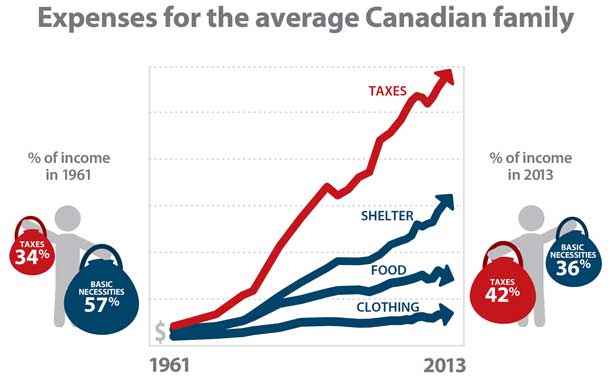
In 2013, the average Canadian family earned $77,381 in income
VANCOUVER, BC – ECONOMY – If you asked the average Canadian family what their largest expense is, many would probably say housing. And you can’t blame them. Mortgage and rental payments are a painful monthly reminder of how much we pay for this basic necessity.
But what if we told you that the average family’s largest expense is, in fact, taxes?
When we say taxes, we don’t just mean income taxes. We’re talking about all the taxes you pay to all levels of governments (federal, provincial, and local). This includes a combination of both visible and hidden taxes – everything from income taxes, which are less than a third of the total, to payroll taxes, health taxes, sales taxes, property taxes, profit taxes, fuel taxes, vehicle taxes, import taxes, alcohol and tobacco taxes, and much more.
In 2013, the Average Canadian Family paid $32,369 in total taxes
For 2013, we estimate that the average Canadian family earned $77,381 in income and paid $32,369 in total taxes or 41.8 per cent of income (the average here includes single people). In the same year, just 36.1 per cent of the average family’s income went to food, clothing, and shelter combined. Indeed, Canadian families spend more on taxes than the basic necessities of life.
But it wasn’t always this way.
Back in 1961 (the first year for which we have calculations), the average family earned approximately $5,000 and paid a much smaller portion of its household income in taxes (33.5 per cent) while spending proportionately more on the basic necessities (56.5 per cent).
In a recent report published by the Fraser Institute, we track the total tax bill of the average Canadian family from 1961 to 2013. Since 1961, we find that the total tax bill increased by 1,832 per cent, dwarfing increases in shelter costs (1,375 per cent), clothing (620 per cent), and food (546 per cent). Even after accounting for inflation, which is the change in overall prices, the tax bill shot up 147 per cent over the period.
Over the past five decades, the total tax bill grew much faster than the cost of basic necessities and now taxes eat up more income than any other single family expense.
With more money going to the government, the reality is that families have less to spend on things of their own choosing, whether it’s a new car, technological gadget, or family vacation. They also have less money available to save for retirement or their children’s education, or to use to pay down household debt.
While there’s no doubt that taxes help fund important government services, the real issue is the amount of taxes that governments take compared to what we get in return. With almost 42 per cent of income going to taxes, Canadians should ask whether they get the best value for their tax dollars.
Are we paying too much, too little, or just the right amount? That’s up to you and your family to decide.
But to make an informed assessment, you must have a complete understanding of all the taxes you pay. Unfortunately, it’s not so straightforward because the different levels of government levy such a wide range of taxes – many of which are buried in consumer prices and hard to discern. Therein lies the value of our calculations.
Armed with this knowledge, we can hold our governments more accountable for the resources they extract and continue a public debate about the overall tax burden, the amount and scope of government spending, and whether we’re getting our money’s worth.
Charles Lammam, Milagros Palacios, and Sean Speer are analysts at the Fraser Institute. The Canadian Consumer Tax Index 2014 is available at www.fraserinstitute.org
Troy Media






